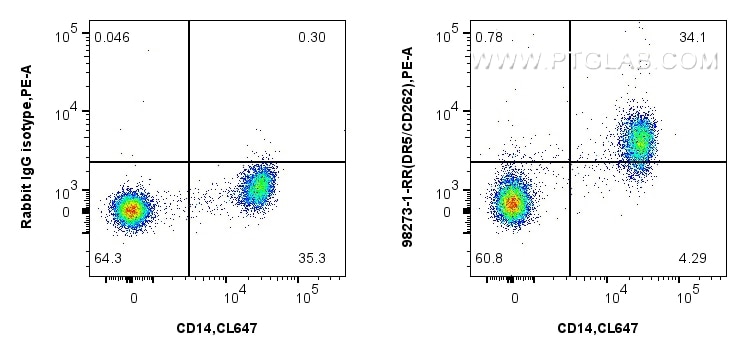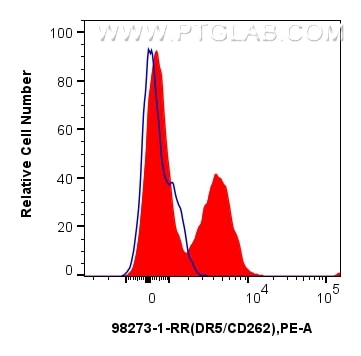Validation Data Gallery
Tested Applications
Recommended dilution
| Application | Dilution |
|---|---|
| This reagent has been tested for flow cytometric analysis. It is recommended that this reagent should be titrated in each testing system to obtain optimal results. | |
Product Information
98273-1-PBS targets DR5/CD262 in FC applications and shows reactivity with human samples.
| Tested Reactivity | human |
| Host / Isotype | Rabbit / IgG |
| Class | Recombinant |
| Type | Antibody |
| Immunogen |
CatNo: Eg1648 Product name: Recombinant Human DR5 protein (rFc Tag)(HPLC verified) Source: mammalian cells-derived, pHZ-KIsec-C-rFc Tag: C-rFc Domain: 56-182 aa of BC001281 Sequence: ITQQDLAPQQRAAPQQKRSSPSEGLCPPGHHISEDGRDCISCKYGQDYSTHWNDLLFCLRCTRCDSGEVELSPCTTTRNTVCQCEEGTFREEDSPEMCRKCRTGCPRGMVKVGDCTPWSDIECVHKE 相同性解析による交差性が予測される生物種 |
| Full Name | tumor necrosis factor receptor superfamily, member 10b |
| Calculated molecular weight | 48 kDa |
| GenBank accession number | BC001281 |
| Gene Symbol | DR5 |
| Gene ID (NCBI) | 8795 |
| Conjugate | Unconjugated |
| Form | |
| Form | Liquid |
| Purification Method | Protein A purfication |
| UNIPROT ID | O14763 |
| Storage Buffer | PBS only{{ptg:BufferTemp}}7.3 |
| Storage Conditions | Store at -80°C. |
Background Information
DR5, also known as CD262, TNFRSF10B, TRAILR2, TRICK2 and KILLER, is a widely expressed single-pass type I membrane protein belonging to the tumour necrosis factor receptor superfamily (TNFRSF). It is a receptor for TNF-related apoptosis-inducing ligand (TRAIL), which is a member of the tumor necrosis factor (TNF) family of cytokines and induces apoptosis in a wide variety of cells (PMID: 9311998). DR5 contains two extracellular cysteine-rich repeats, typical for TNF receptor (TNFR) family members, and a cytoplasmic death domain (DD), through which DR5 is capable to transmit the apoptotic signal (PMID: 9311998; 20531300).


